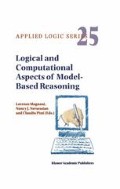Abstract
In this paper we discuss diagnosis of faults in systems. The latter are understood as structured wholes of components. Three types of diagnosis can be distinguished and are defined: non-explanatory, weak explanatory and strong explanatory. After the analysis of the reasoning process that leads to non-explanatory diagnosis, we argue that the predicative adaptive logic D* is an adequate tool for modeling this kind of diagnostic reasoning. Subsequently, we follow the same pattern for weak and strong diagnosis and describe the logic D* which adequately formalizes weak diagnostic reasoning, even when underlying theoretical knowledge is taken into account. Finally it is argued that the same logic can be applied in the case of strong diagnostic reasoning whenever a number of conditions are fulfilled.
Access this chapter
Tax calculation will be finalised at checkout
Purchases are for personal use only
Preview
Unable to display preview. Download preview PDF.
References
Batens, D., 2000, A survey of inconsistency-adaptive logics, in: Frontiers of Paracon-sistent Logic, D. Batens, C. Mortensen, G. Priest, and J.P. Van Bendegem, eds., Kings College Publications, London, pp. 49–73.
Batens, D., 1998, Inconsistency-adaptive logics, in: Logic at Work. Essays Dedicated to the Memory of Helena Rasiowa, E. Orłowska, ed., Springer Verlag, Heidelberg, New York, pp. 445–472.
Batens, D., Meheus, J., Provijn, D., and Verhoeven, L., Some adaptive logics for diagnosis (to appear).
Batens, D. and Meheus, J., 2000, The adaptive logic of compatibility, Studia Logica 66:327–348.
Magnani, L., 2001, Abduction, Reason and Science. Processes of Discovery and Explanation, Kluwer Academic/Plenum Publishers, New York.
Meheus, J., Erotetic arguments from inconsistent premises (to appear).
Reiter, R., 1980, A logic for default reasoning, Artificial Intelligence 13:81–132.
Reiter, R., 1987, A theory of diagnosis first principles, Artificial Intelligence 32:57–95.
Weber, E. and De Clercq, K., 2002, Why the logic of explanation is inconsistencyadaptive, in: Inconsistency in Science, J. Meheus, ed., Kluwer Academic/Plenum Publishers, Dordrecht, pp. 165–184.
Weber, E. and Provijn, D., A formal analysis of diagnosis and diagnostic reasoning, Logique & Analyse (in print).
Author information
Authors and Affiliations
Editor information
Editors and Affiliations
Rights and permissions
Copyright information
© 2002 Springer Science+Business Media Dordrecht
About this chapter
Cite this chapter
Provijn, D., Weber, E. (2002). Adaptive Logics for Non-Explanatory and Explanatory Diagnostic Reasoning. In: Magnani, L., Nersessian, N.J., Pizzi, C. (eds) Logical and Computational Aspects of Model-Based Reasoning. Applied Logic Series, vol 25. Springer, Dordrecht. https://doi.org/10.1007/978-94-010-0550-0_6
Download citation
DOI: https://doi.org/10.1007/978-94-010-0550-0_6
Publisher Name: Springer, Dordrecht
Print ISBN: 978-1-4020-0791-0
Online ISBN: 978-94-010-0550-0
eBook Packages: Springer Book Archive

